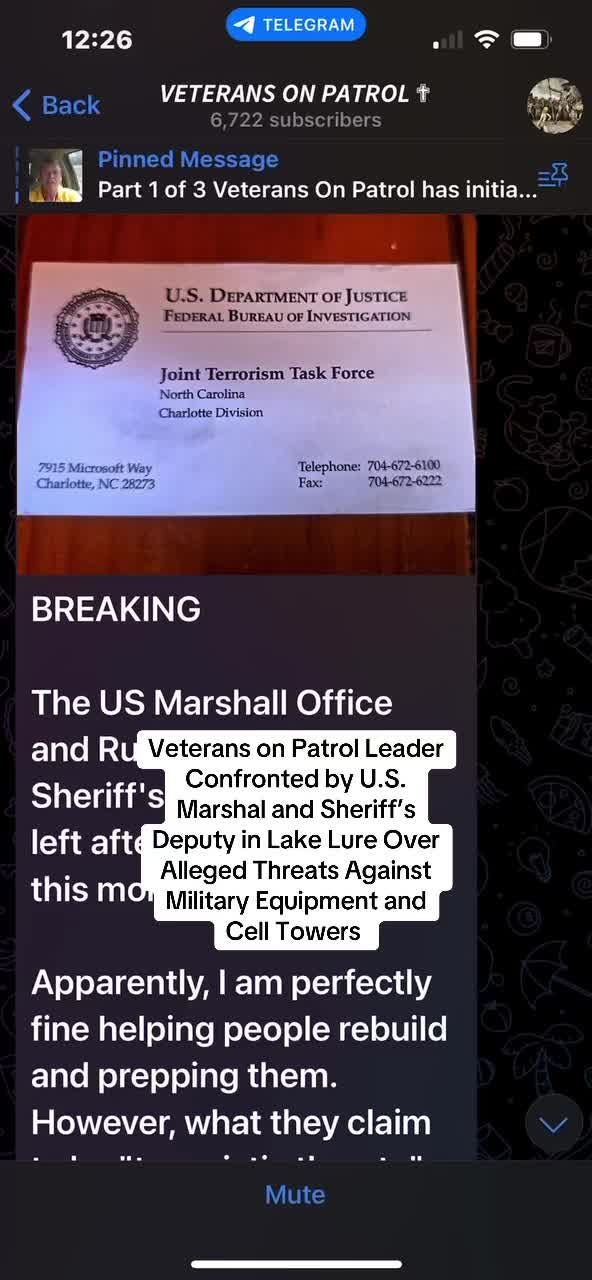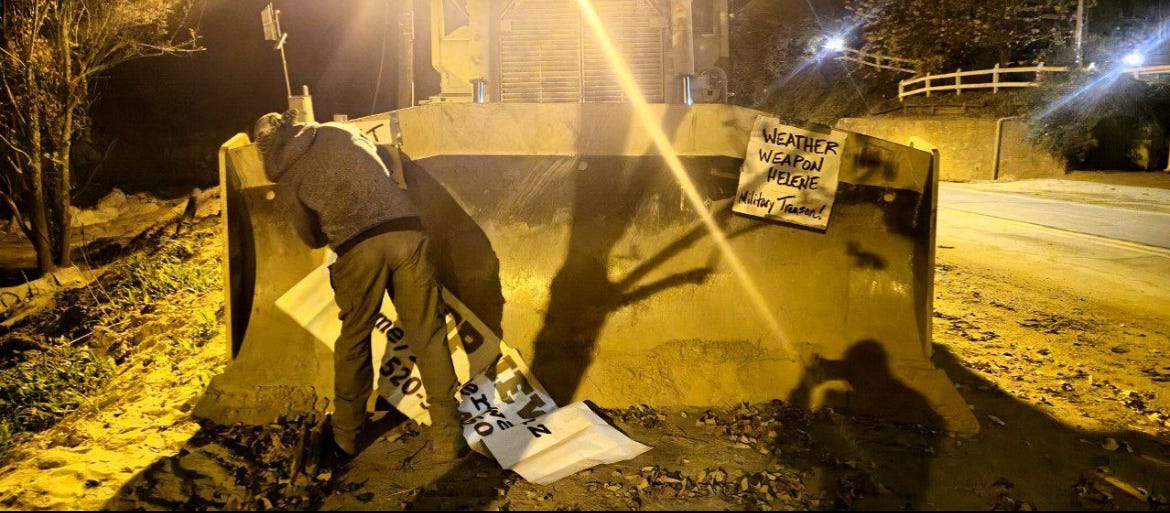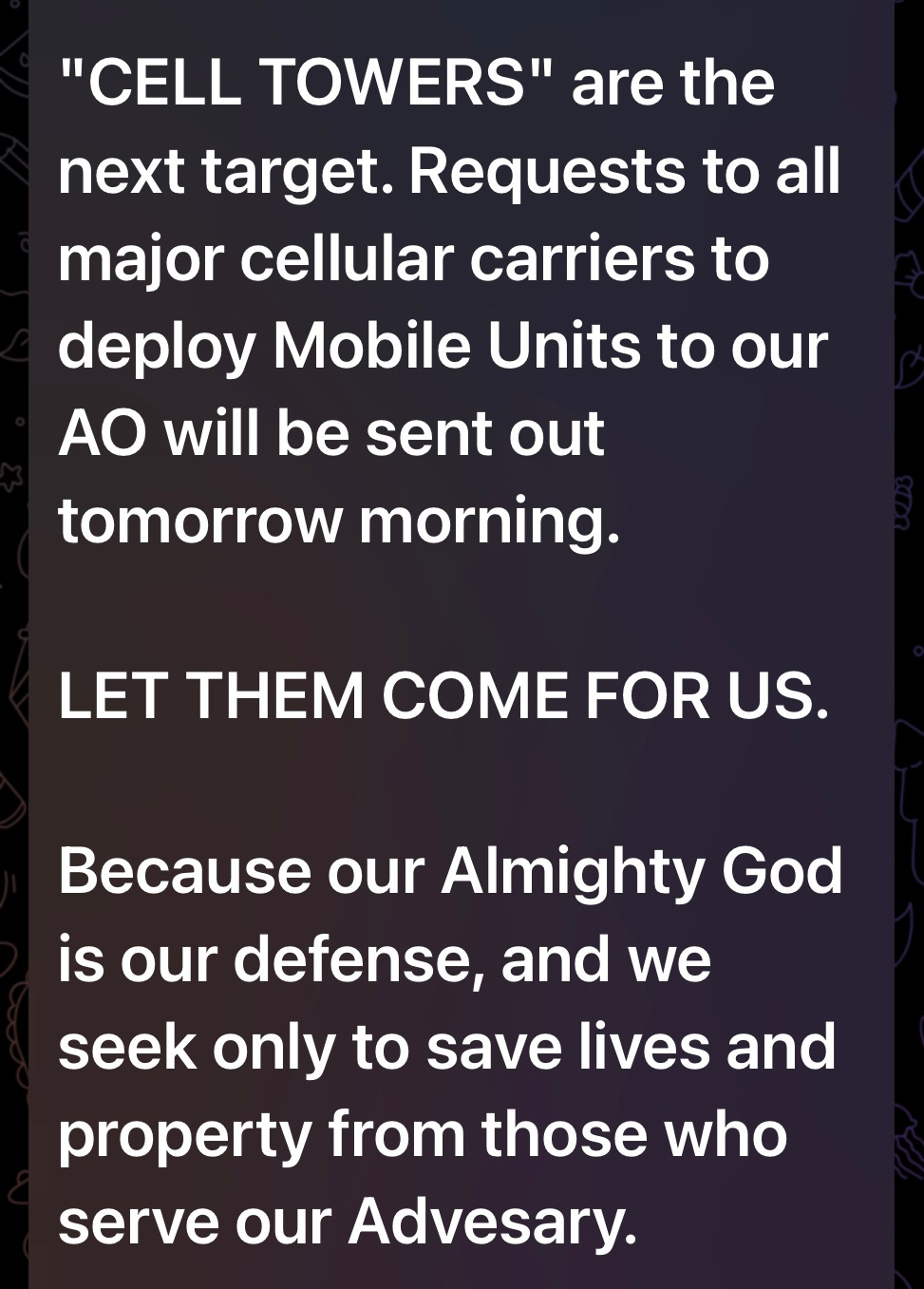Exclusive details: Veterans on Patrol leader confronted by cops over alleged threats in Lake Lure and Chimney Rock
Michael Lewis Arthur Meyer says actions are aimed at “saving lives,” as Deputy U.S. Marshal urged him to stop operations, video shows
To my new subscribers (and a reminder to loyal readers), welcome to Cops & Congress, where facts come first, followed by in-depth commentary and analysis. Paid subscribers enjoy exclusive access to scoops requiring investigation of public records. Your support directly funds the detailed research behind my independent journalism. (ICYMI: Six reasons to support my independent journalism)
Situational awareness: An exclusive, or scoop is an important news story that is first reported by a journalist. This goes beyond breaking news when no other journalists are known to be reporting on an important issue.
Michael Lewis Arthur Meyer, leader of Veterans on Patrol (VOP), shared a message in the group’s Telegram channel on October 30, announcing his latest efforts to combat what he described as the misuse of military technology against civilians. Over the past few weeks, members of the group, who claim that Helene was caused by a “weather weapon,” have been making conspiracy-driven claims that the U.S. military is attempting to kill U.S. citizens with “directed energy weapons.”
Veterans on Patrol’s channel on the encrypted social-media platform Telegram posts many messages ranging from offers of assistance to conspiracy theories and threats against cell towers and military equipment.
Meyer stated that VOP had recently sabotaged a Humvee by adding sugar to its fuel tank and that plans involved disrupting cell towers to prevent "military deployments against Mankind." Meyer insisted these actions were part of his group’s mission to “save lives” and “rebuild communities.”
A video posted on November 6 shows U.S. Deputy Marshal Joe Fialka, Rutherford County Sheriff’s Deputy Criminal Investigator Andrew Millard, and two other deputies at a Lake Lure area residence to address Meyer’s actions. In the video, Fialka confronts Meyer about his activities, urging him to stop what he described as “threats against the military” and critical infrastructure.
During the discussion, Fialka highlighted the importance of communication systems and warned Meyer that tampering with cell towers and military property could lead to serious consequences. “These guys need these cell phone towers,” Fialka explained, cautioning Meyer that further interference might provoke federal action from the Department of Justice (DOJ). He warned him to “stop making threats against infrastructure.”

 Tiktok failed to load.
Tiktok failed to load.Enable 3rd party cookies or use another browser
Meyer defended his actions as a form of civilian protection, explaining that he views VOP’s mission as vital to safeguarding the community from government misuse of technology. "We seek only to save lives and property," Meyer asserted, presenting himself as an independent journalist dedicated to preparing residents for potential disasters.
Despite Fialka’s warnings, Meyer remained firm in his stance, stating that VOP would continue its work. He described VOP’s ongoing activities as “community rebuilding,” which he said involved preparing households for emergencies and aiding with construction projects intended to support the community.
The conversation ended with Deputy Marshal Fialka’s final appeal for Meyer to avoid actions that could be interpreted as threats against federal infrastructure, cautioning that further escalation could result in DOJ involvement and potential federal charges. Meyer, however, insisted that VOP’s actions are essential for what he claims is the mission of protecting civilians.
This isn’t the first brush with the law for Meyer. Local Lake Lure residents, including Hilary Yoxall, initially cooperated with the group when Meyer showed up at Ingles to help with donations with others, but Yoxall soon began to complain about threats and harassment. Meyer left soon after Lake Lure police got involved and Ingles had him trespassed from the property. Meyer has called himself a humanitarian and has routinely rejected government interference with his group’s activities. In the recent video, he appeared to ask the U.S. Marshal for guidance about the next steps of his concerns.
Opinion & Analysis
Cops & Congress Commentary: Government Overreach vs. Personal Choice — Where to Draw the Line?
This recent video shines a stark light on where personal liberty, government authority, and public safety collide.
At its core, this conflict raises serious questions about government overreach and the boundaries of personal choice. Meyer claims his group’s mission is to protect civilians, often taking actions he describes as “essential” for community defense. Yet, when personal freedom is asserted in a way that could endanger public infrastructure and national security, officials are tasked with responding to prevent escalation.
Government agencies are generally expected to intervene when threats emerge to critical infrastructure, especially as security risks grow with advancements in technology. Yet, there’s an underlying tension here: Meyer views his actions as part of his rights and responsibilities as a citizen, arguing that VOP is “saving lives” by countering the potential misuse of government technology. Whether one sees his motives as valid or misguided, Meyer’s case touches on the universal question: When does government intervention become government overreach?
The issue of personal autonomy came up during Fialka’s exchange with Meyer. Fialka appeared genuinely concerned about Meyer’s judgment and stability, at one point directly questioning Meyer’s mental state.
Meyer’s defense of his mission only seemed to reinforce Fialka's concerns, leading to further probing. This line of questioning highlighted the fine line law enforcement must walk when assessing both physical threats and the mental well-being of those involved in alleged illegal acts. Meyer, undeterred, doubled down on his position, asserting that his intentions were aligned with protecting the community.
From a constitutional standpoint, the issue boils down to whether individual actions that impact federal infrastructure are protected as expressions of personal choice or if they fall into a category that necessitates intervention. Meyer’s case is more than just a single confrontation; it’s part of a larger debate on where to draw the line between government responsibility and individual autonomy. In a world where people feel increasingly empowered to defend their communities, however they define that mission, government action can seem heavy-handed—even when it is legally justified.
As citizens, we are afforded a range of freedoms, including the right to express dissent. But when actions could endanger the very infrastructure that protects society, federal agencies may perceive an obligation to act, albeit sometimes in ways that appear intrusive. Meyer’s defiance reflects a broader sentiment shared by many who believe in limited government oversight. However, as Deputy Marshal Fialka suggested in his remarks, this sentiment can sometimes blur the line between activism and endangerment.
Personal choice is a foundational right, but it comes with a level of personal responsibility. As technology continues to interweave with national security, the government may increasingly find itself at odds with citizens who view some of these technologies as intrusive or dangerous. While Meyer remains firm in his beliefs, Fialka’s warnings highlight the delicate balance between personal conviction and potential repercussions. At the end of the day, each side must weigh the cost of action against the value of restraint. Meyer has said he will remain in the Chimney Rock area for three years.
🏛️ All those mentioned are presumed innocent until proven guilty.
Learn more about this newsletter and my background. I am guided by the Society for Professional Journalists Code of Ethics. Follow me on X (Twitter), Facebook, Linkedin, Instagram, TikTok, and YouTube. Send constructive criticism, fan mail and tips with public documents for future stories: CopsandCongress@gmail.com.
Interested in sponsoring a future issue of Cops & Congress? Email me with your ideas and budget.
(Free subscribers: Upgrade to paid to leave a comment below and don’t miss out on exclusive content.)






